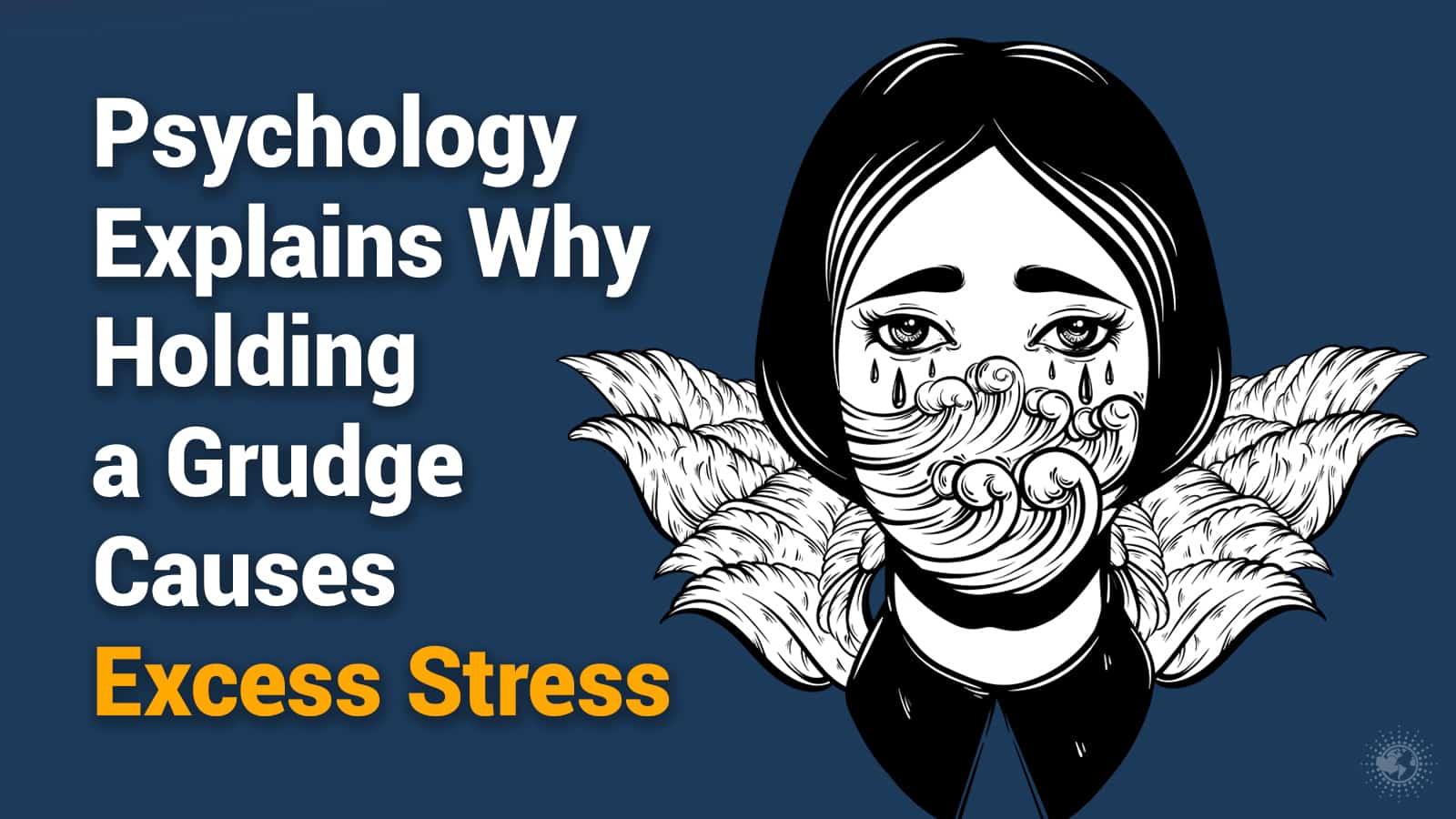Everyone has been hurt or wronged by someone, but holding a grudge and being unforgiving doesn’t help you feel better. Quite the opposite, however, as it will only make you feel worse. Whether it is a family member, a co-worker, a significant other, or a friend, it is never an easy situation.
You may be left with negative feelings such as anger, bitterness, vengeance, sadness, confusion, or hatred. These feelings aren’t helping you or the situation, however, and should be addressed immediately. While you may think that harboring these feelings is harmless, psychologists now prove that this isn’t the case.
When you hold on to a grudge and let the negative feelings linger, you’re only causing yourself more harm. You will be holding yourself back from experiencing peace, hope, and joy. Plus, you’ll be bringing more stress to yourself.
Not only will you be bringing stress to yourself, but you will also be bringing negativity to all aspects of your life. The way you are feeling will eventually cause problems, and those closest to you may feel it. Your energy will show what you are feeling, no matter how much you try to hide it.
The Reasons Holding a Grudge Causes Excess Stress
Contents
When you hold a grudge and continue to harbor negative feelings, the stress it causes can be serious. You’ll notice your heart rate increase, a rise in your blood pressure, and a tightening in your muscles. These are signs that your body is experiencing excess stress and it will only get worse if you are unforgiving.
Being stressed can cause memory problems, difficulty sleeping or sleeping too much, and sometimes it can cause serious health conditions. If you are holding a grudge and notice these symptoms, it’s likely caused by stress due to the negativity. There are many ways that this can cause excess stress, and knowing these reasons can help you reverse it.
Research shows that when you hold a grudge, you continue to rehearse painful memories from your past. Each time this happens, it brings back the negative feelings that you associate with the situation. Each time, the stress it causes will be worsened until it turns into something more serious, such as depression.
Other reasons that holding a grudge can cause excess stress are as follows:
Can Cause Anger or Bitterness in a New Relationship
When you are harboring negative feelings, they will be reflected in other relationships. Those feelings will show, no matter how well you try to hide them. Eventually, they will begin causing anger and bitterness in a relationship that had nothing to do with the situation.
To stop allowing the feelings to interfere with your other relationships, you have to let go of them. You can only do this by forgiving the person who wronged you.
You Are Not Able to Enjoy the Present
As the negative feelings pile up, you’ll notice you aren’t as present as you used to be. Your mind will be preoccupied with the negativity, and you won’t be able to enjoy what is happening right now. Don’t let the actions or words of someone else affect the joy you could be feeling.
Grudges Might Make You Depressed or Anxious
The longer you hold on to the negativity and pain, the more likely you are to experience depression or anxiety. Even if you don’t realize it, these feelings will keep piling up until you aren’t sure how to handle it anymore. It can cause problems with your hormones, and it can have a huge negative impact on your mental health.
You May Feel as if Your Life Lacks Purpose
When you are harboring these feelings, you are making yourself believe that your life lacks purpose. Even if you don’t realize that this is what you are doing, it is happening. This is because you are so focused on what happened and how it made you feel that it becomes all-consuming.
You will eventually forget about how meaningful your life is because you’ll be so angry and hurt. The things that you will notice in your life are the ones that reflect how you are feeling. So, if you are feeling hostile, you’ll start to notice more hostility around you.
Since your environment is a product of your mood, it hugely impacts your life. To avoid this and to remember your purpose in life, you have to forgive the person who hurt you. Then, you will be able to refocus on the things and people that truly matter.
Could Lose Connections with Others
As the negative feelings take over your life, you may lose connections with other people that you care about. The feelings may cause you to push people away so that you can be alone to wallow. Even if you don’t push people away on purpose, the negative energy you will be carrying around may do it.
What is Forgiveness?
While it is different for everyone, forgiveness involves letting go of resentment. It means that you have to stop feeling like you have to get revenge. You will have to make a conscious decision to stop harboring negative feelings and thinking of revenge.
It’s not likely that you will ever forget what was said or done to you, even with forgiveness. By forgiving, however, you can start to regain control of your life and feelings. You will also be able to feel empathy, compassion, and understanding for the person who wronged you.
Ultimately, forgiveness is a way to bring peace to yourself. It helps you move on positively and let go of any negative feelings you are still experiencing. Additionally, it helps you focus on the positives in your life instead of consuming your thoughts with the situation.
The Benefits of Forgiveness
When you forgive someone, you will be benefitting yourself more than you will be helping them. By forgiving those who have wronged you, you will be allowing yourself to experience:
-healthy relationships
-less stress and anxiety
-an increase in self-esteem
-lower blood pressure and improved heart health
-better mental health
-fewer depression symptoms
How You Can Begin to Forgive
Forgiveness happens differently for everyone. You must decide on the process you will take on your own, but some ideas may help you.
First, you have to realize how beneficial forgiveness is to your life. Then, determine who it is that needs to be forgiven and what they need to be forgiven for.
You have to acknowledge how the person made you feel, and make a note of how this affects you. If you don’t do this part, it will be nearly impossible for you to release your feelings. You can then make a conscious decision to forgive those who have hurt you.
If you still can’t bring yourself to forgive them, you may consider seeing a counselor. There are also support groups you could look for to help you through the process.
Once you’ve made some progress, stop viewing yourself as a victim. While the way you felt will never be forgotten, you have to stop feeling like a victim to fully move on. This way, you will be taking back control of your own life and you will notice a feeling of relief.
Some other ideas for beginning to forgive someone include:
-practicing empathy by seeing the situation from their perspective
-consider how you would have reacted if you were them in that situation
-think about the times you have hurt someone you love, and consider if they forgave you
-write about the situation and feeling in a journal
-meditate
-speak with someone you trust and can rely on
Does Forgiveness Mean You Will Have to Continue the Relationship?
While forgiveness oftentimes repairs a relationship and allows for reconciliation, that isn’t always the way it works out. Sometimes, you might not even want to resume the relationship. In this case, forgiveness is still important so that you can move on and let go of negative feelings.
Forgiveness is personal and doesn’t always require a face-to-face conversation. It can happen within yourself, and no one else will even have to know. This is how you will likely want to handle it if you can’t or don’t want to reconcile with them.
Final Thoughts on Psychology Explains Why Holding a Grudge Causes Excess Stress
The excess stress that is caused by holding a grudge can cause many problems in your life, as described above. You have to consciously decide to stop letting things that have happened control and define your life. Being unforgiving will only cause you more problems than forgiving the person would cause.
Holding grudges is more detrimental to you than to those you are holding them against. You can’t continue letting them win and control your feelings, so you have to forgive.
Even if you can’t forget what was said or done to you, you can still make a personal choice to forgive. Then, you will be able to move on with your life and focus on all the things that matter.
Source: Psychology Explains Why Holding a Grudge Causes Excess Stress- powerofpositivity.com

